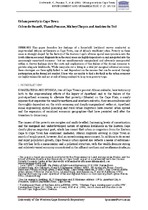Urban poverty in Cape Town

View/
Date
2005Author
de Swardt, Cobus
Puoane, Thandi
Chopra, Mickey
du Toit, Andries
Metadata
Show full item recordAbstract
This paper describes key findings of a household livelihood survey
conducted in impoverished African settlements in Cape Town, one of Africa’s wealthiest
cities. Poverty in these areas is strongly shaped by the history of the Eastern
Cape’s adverse spatial incorporation into the South African economy. Migrants from
the rural areas are highly dependent on and integrated into the increasingly monetized
economy – but are simultaneously marginalized and adversely incorporated
within it. Survey findings show the costs and implications of this failure of the formal
economy to provide adequate livelihoods. While many eke out a living in a vital yet
marginal informal economy, these strategies are thoroughly linked to and dependent
on the income that can be secured through participation in the formal job market.
Those who are unable to find a foothold in the urban economy are highly vulnerable
and are at risk of being confined to long-term poverty traps.
